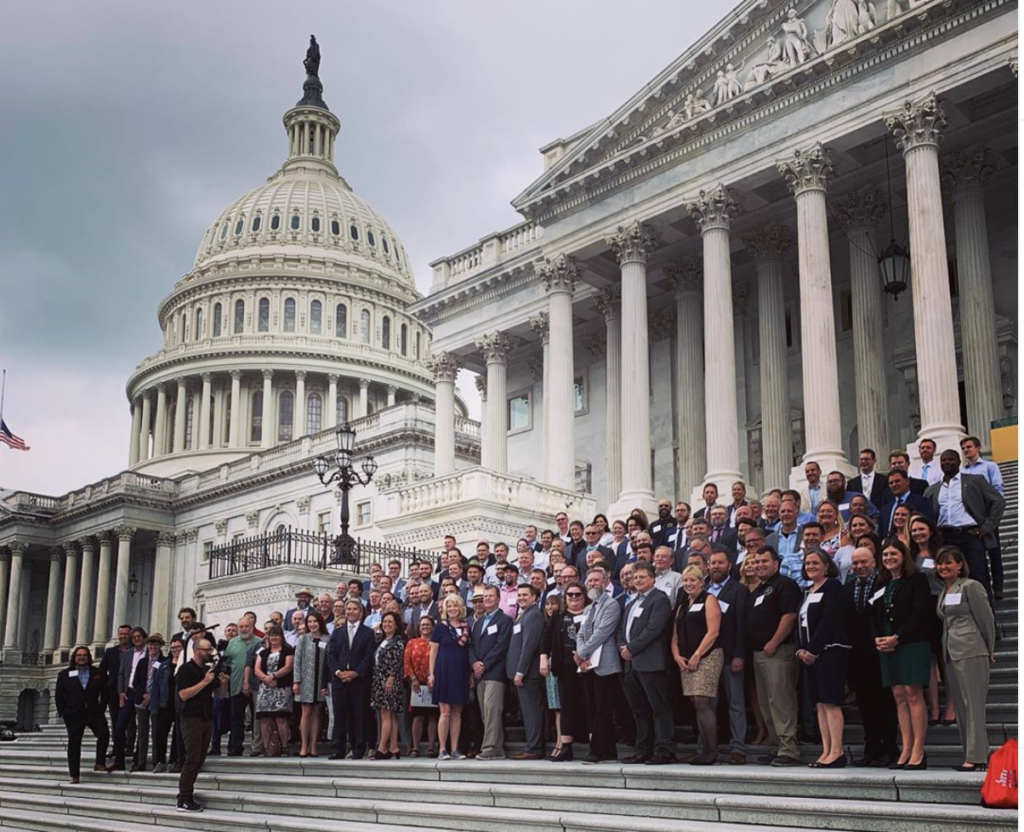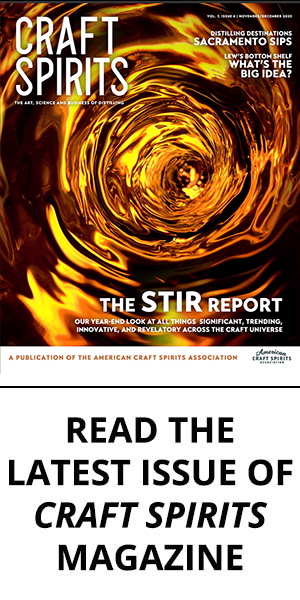
Permanence. That was the buzzword that echoed through the halls of Congress recently as 200 of America’s craft spirits producers and industry allies collectively traversed hundreds of miles through the network of House of Representatives office buildings, urging lawmakers to support and sign on as co-sponsors of the House version of the bill that would permanently extend Federal Excise Tax (FET) relief.
It was the second full day of Congressional meetings during the American Craft Spirits Association (ACSA) and Distilled Spirits Council of the United States (DISCUS) Public Policy Conference, the major focus of which was rallying support on Capitol Hill for HR 1175. The bill is the 2019 update of the 2017 Craft Beverage Modernization and Tax Reform Act (CBMTRA), which reduced the FET on distillers to $2.70 from $13.50 per gallon on the first 100,000 proof gallons and enables small spirits producers to enjoy tax parity with breweries and wineries. The original law is set to expire on December 31, 2019.
“This is the very first time since Prohibition that distilled spirits have enjoyed any kind of tax relief,” ACSA CEO Margie A.S. Lehrman told Congressional staffers. “Without it these businesses could disappear.”
The House-focused Hill climb followed a day of meetings with members of the U.S. Senate, focusing on passage of the Senate’s version of CBMTRA, S.362.
ACSA President Chris Montana, owner of Du Nord Craft Spirits in Minneapolis, said both days of Congressional meetings were highly productive. “The reception’s been great and [lawmakers] are supportive of our bills and what we’re trying to do,” Montana said. “I think people really get it. The challenge is that even though we have this bipartisan bill, it still has this process, it still has to make it through the ‘sausage making.’”
The Senate version of the new FET reduction bill, S.362, sponsored once again by Sen. Ron Wyden (D-OR) and Sen. Roy Blunt (R-MO), currently has 66 co-sponsors. The House bill, HR 1175, sponsored by Rep. Ron Kind (D-WI) and Rep. Mike Kelly (R-PA), has 266 co-sponsors. The 2017 version had more than 300 co-sponsors—a number that ACSA and DISCUS hope to exceed.
“I’m optimistic,” Montana said. “I think we can get up to the same kind of support we had last Congress, even better.”
On the first day of meetings, craft distiller attendees were heartened to hear from a number of the federal legislators who are helping them.
“I want you to be able to enjoy the intent of what my original law was—that being permanent,” Sen. Wyden told the group.
The temporary nature of the law that did pass in 2017 created a lot of uncertainty, Wyden said.
“[Legislators] slapped an expiration date on it,” he said, “and that has meant all of you don’t have the certainty and predictability you need and the whole point of the law I wrote was to take you off all of those rollercoasters.”
Wyden said the key to the law’s future is building a coalition among stakeholders who can find common ground “and keep pushing.”
“Political change is rarely top-down, it’s bottom-up, so there are, like, 34 people who need small businesses from their state to come to meet with them,” Wyden advised. “And you don’t call them names, [you say] ‘we came to show you what the economic ripples are going to be if you sign on to be a part of it.’”
Senator Rob Portman [R-OH] was instrumental in getting the 2017 version included with that year’s Tax Cut and Jobs Act at the eleventh hour and he reaffirmed his support at the Conference.
“Just keep expressing the urgency of it, the impact if it doesn’t get extended,” Portman told attendees. “Encourage members [of Congress] not to kick the can down the road. Let’s get it done now.”
The advocacy effort, Portman added, does not end when small distillers leave Washington. Every producer, he said, should be in touch with their senators and representatives and should invite the legislators to their distilleries.
“The truth of the matter is, if we’re going to be able to see the craft spirits business grow and continue to employ people and do everything you guys do to make the world a better place—and I mean that—we need to fight to get this bill passed,” said Sen. Jon Tester (D-MT). “Going out and talking to your reps is very important and making sure you get a commitment from them on this issue is really important.
CBMTRA has been about more than a tax cut, as it also represents the first time craft spirits have achieved some level of parity with wine and beer on the federal tax level. If the FET reduction is allowed to expire, that parity goes away and small distillers go back to paying exactly what large producers pay. Craft breweries and small wineries would return to their previously tiered tax structure, where those producers already were paying a lower rate than their much larger beer and wine-making counterparts. That’s a key point that craft spirits producers addressed with federal lawmakers today.
“It’s helpful to remind people that the spirits industry had no reduced rate for small producers until 2017, whereas beer got something in the ‘70s and wine got a tax credit in the ‘90s,” said ACSA Public Policy Adviser Jim Hyland of the Pennsylvania Avenue Group. “We use the term parity, and that’s seemed to have resonated with a lot of folks…What we say is we just want parity with beer and wine, a permanent, lower rate for craft spirits producers.”
In June a bill emerged from the House Ways and Means Committee that proposed a one-year-extension on the FET cut.
On the second day of meetings, craft spirits producers shared their stories with Representatives and Congressional staff, detailing how passage of the 2017 CBMTRA—which went into effect on January 1, 2018—has been essential in helping them grow their businesses. Distillers explained how they were able to re-invest in their companies by upgrading equipment and hiring necessary staff.
Maureen Reed, corporate marketing manager at KO Distilling in Manassas, Virginia, was one of those hires. She was among her commonwealth’s delegation on Capitol Hill.
“Representing Virginia distillers in D.C. this week has been an honor and we are so grateful for the support that our Representatives have shown for the Craft Beverage Modernization and Tax Reform Act,” Reed said. “FET reform gives distillers more parity with the rest of the alcohol industry and has allowed KO Distilling to invest in a new still and a new rickhouse, continue to support Virginia agriculture and tourism and even hire four new employees—myself included.”
The benefits of FET relief extend well beyond the distillers themselves. It translates to growth potential for the broader spirits ecosystem, including ingredient growers and suppliers (grain, fruit, etc.), equipment manufacturers, business solutions providers and other trading partners.
“We are a small company and two years ago we had six employees, now we have nine,” said Randall Buxbaum, national sales manager of distillery software supplier Whiskey Systems. “We actually have seen an uptick in 2018 and 2019—we’re up healthy double digits.”
Before the FET reduction, Buxbaum noted, tech solutions like Whiskey Systems would have been a difficult investment for many spirits producers to justify. The tax cut, he said, has enabled distillers to bring more efficiency to their operations with such systems.
In today’s political climate, bipartisan support is rare, which makes the journey of CBMTRA all the more remarkable. Public Policy Conference attendees started the second day of the gathering with a stark reminder of just how polarized Washington has become, courtesy of guest speaker Carl Hulse, chief Washington correspondent for The New York Times and author of “Confirmation Bias: Inside Washington’s War Over the Supreme Court, from Scalia’s Death to Justice Kavanaugh.”
But there’s scarcely been a more hopeful sign of across-the-aisle cooperation than at the reception that officially closed the Public Policy Conference. Congressional staffers from both sides put aside their partisan differences for the evening to sample some of the finest products the country’s small distillers have to offer. American craft spirits just may be the common ground everyone’s been seeking.

